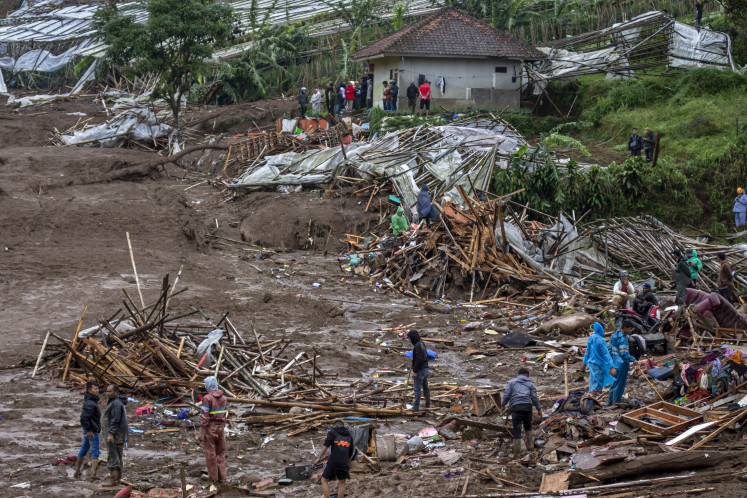Popular Reads
Top Results
Can't find what you're looking for?
View all search resultsPopular Reads
Top Results
Can't find what you're looking for?
View all search resultsIdul Fitri mass exodus, a rough patch for disabled
Traveling is challenging for most people, and those with disabilities face even greater challenges during the mass exodus season
Change text size
Gift Premium Articles
to Anyone
T
raveling is challenging for most people, and those with disabilities face even greater challenges during the mass exodus season.
For Priyo Siswoyo, the challenges begin well before starting the actual journey.
Wheelchair-bound since a work accident in 2003, it costs Priyo a fortune to rent a car to return to his hometown in Wonogiri, Central Java, as using public transportation is no longer an option for him.
Last time he spent Idul Fitri in his hometown was in 2009, when he spent Rp 2 million (US$152) to rent a car and made “modifications” to the car’s interior.
“I have to remove the chairs in the back seat and replace them with a small bed for me and my family,” he told The Jakarta Post recently. However, Priyo can no longer spend that much money to take part in the Idul Fitri mass exodus.
Wheelchair-bound for more than a decade, Priyo has come to understand that his life comes with more limitations, and traveling is one of his biggest challenges. He said he had grown accustomed to spending Idul Fitri at his residence in Pondok Bambu, East Jakarta.
Priyo, who earns a living as a painter and Paralympic bowling athlete, said to go home next year, he hopes to win prize money from a bowling competition.
“I don’t want to take public transportation and end up being someone else’s burden. With prize money I will be able to rent a car for next year’s exodus,” he said.
The homebound travel, locally known as mudik, has been carried out for decades. In a bid to provide a more secure and convenient exodus, transportation and infrastructure projects were rushed by the government and city administration.
However, during the period, disabled groups, which according to Social Affairs Ministry data make up 11 to 13 percent of the population, are still struggling to have their voices heard. A recent site visit by The Friendly Exodus for Children and the Disabled (MRAD) Program found that the government had yet to provide appropriate transportation facilities and infrastructure for the disabled.
“There are no restrooms for the disabled at the Pulo Gadung and Kampung Rambutan bus terminals in East Jakarta. Tanjung Priok Port, meanwhile, has such facilities but they are locked, in disrepair and unused,” Ilma Sovri Yanti from MRAD told the Post.
Similarly, to take a bus, Ilma said the disabled had to get extra assistance to get down to the same level as the buses in order to board them.
Catur Sigit Nugroho, another bowling Paralympic athlete, said the biggest challenge to get to his hometown in Central Java was the 16 kilometers between the bus terminal and his parents’ house.
Catur said he had registered for a free mudik program facilitated by a private company, however he then withdrew after learning that the program did not come with additional transportation from the terminal to his parents’ house.
“If I arrived at the terminal in the middle of the night, I would be in trouble,” he said.
“The only available transportation is an ojek [motorcycle taxi], but how can a man like me sit on a motorcycle”.
— JP/Indra Budiari










